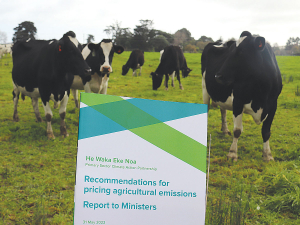Editorial: Getting RMA settings right
OPINION: The Government has been seeking industry feedback on its proposed amendments to a range of Resource Management Act (RMA) national direction instruments.
 HWEN was already on shaky ground with delays meaning it would struggle to be legislated before the election.
HWEN was already on shaky ground with delays meaning it would struggle to be legislated before the election.
OPINION: To Paraphrase the Monty Python dead parrot sketch, it looks as though the much maligned and deeply unpopular He Waka Eke Noa (HWEN) agricultural emissions plan has: … ‘… passed on! Is no more! Has ceased to be! Expired and gone to meet its maker! Bereft of life, it rests in peace!’
HWEN was already on shaky ground with delays meaning it would struggle to be legislated before the election. This was on top of recent reports surfacing of a breakdown in negotiations between the Government and farming groups on a final deal.
The National Party released its agricultural emissions policy last week, which shows it has backed away from the current HWEN plan and will instead introduce a new way to get collective agreement around farm emissions. It would scrap HWEN and give the farmers until 2030 to sort out the problems relating to dealing with emissions – a move that has been largely endorsed by farmer lobby groups.
Key parts of National’s policy include giving farmers the tools they need to reduce emissions – including recognising on-farm sequestration, measuring farm-level emissions by 2025 and updating biotech rules; keeping agriculture out of the ETS but implementing a fair and sustainable pricing system for on-farm agricultural emissions by 2030; and establishing an independent board – with a power of veto retained by the Ministers of Climate Change and Agriculture –to implement the pricing system.
National will also limit the conversion of productive farmland to forestry for carbon farming purposes to protect local communities and food production, as well as promising to review the methane targets.
Meanwhile, despite not having met with agriculture sector leaders since becoming PM Chris Hipkins – and a coterie of ministerial colleagues – met up with farming leaders at last week’s Fieldays to try and get HWEN back on track and lure them away from National’s attractive proposition for dealing with agriculture emissions.
However, one would bet – from the flack farm sector leaders have taken over their meek interactions with Government over HWEN in recent years – they are likely to nod politely and wait for the outcome election before committing hare kari.
Ironically, despite the stumbling block of getting agreement on-farm emissions, the latest Stats NZ figures show that farmers are on track to achieve a 10% reduction in greenhouse gas emissions by 2030 without needing a pricing mechanism.
An independent report, prepared for Alliance farmer shareholders is backing the proposed $250 million joint venture investment by Irish company Dawn Meats Group.
Whangarei field service technician, Bryce Dickson has cemented his place in John Deere’s history, becoming the first ever person to win an award for the third time at the annual Australian and New Zealand Technician of the Year Awards, announced at a gala dinner in Brisbane last night.
NZPork has appointed Auckland-based Paul Bucknell as its new chair.
The Government claims to have delivered on its election promise to protect productive farmland from emissions trading scheme (ETS) but red meat farmers aren’t happy.
Foot and Mouth Disease outbreaks could have a detrimental impact on any country's rural sector, as seen in the United Kingdom's 2000 outbreak that saw the compulsory slaughter of over six million animals.
The Ministry for the Environment is joining as a national award sponsor in the Ballance Farm Environment Awards (BFEA from next year).

OPINION: For years, the ironically named Dr Mike Joy has used his position at Victoria University to wage an activist-style…
OPINION: A mate of yours truly has had an absolute gutsful of the activist group SAFE.